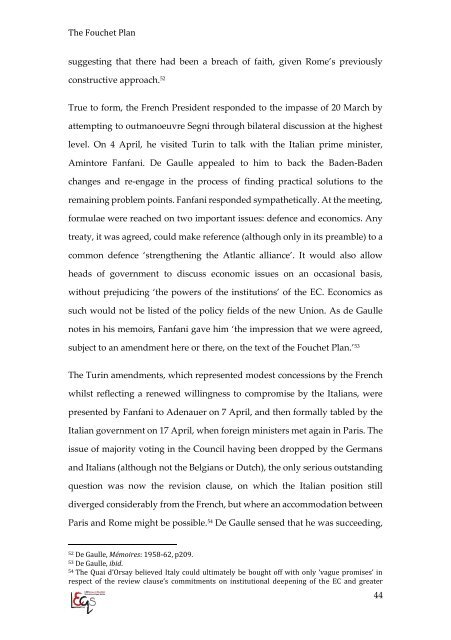The Fouchet Plan De Gaulle’s Intergovernmental Design for Europe
n?u=RePEc:eiq:eileqs:117&r=cdm
n?u=RePEc:eiq:eileqs:117&r=cdm
You also want an ePaper? Increase the reach of your titles
YUMPU automatically turns print PDFs into web optimized ePapers that Google loves.
<strong>The</strong> <strong>Fouchet</strong> <strong>Plan</strong><br />
suggesting that there had been a breach of faith, given Rome’s previously<br />
constructive approach. 52<br />
True to <strong>for</strong>m, the French President responded to the impasse of 20 March by<br />
attempting to outmanoeuvre Segni through bilateral discussion at the highest<br />
level. On 4 April, he visited Turin to talk with the Italian prime minister,<br />
Amintore Fanfani. <strong>De</strong> Gaulle appealed to him to back the Baden-Baden<br />
changes and re-engage in the process of finding practical solutions to the<br />
remaining problem points. Fanfani responded sympathetically. At the meeting,<br />
<strong>for</strong>mulae were reached on two important issues: defence and economics. Any<br />
treaty, it was agreed, could make reference (although only in its preamble) to a<br />
common defence ‘strengthening the Atlantic alliance’. It would also allow<br />
heads of government to discuss economic issues on an occasional basis,<br />
without prejudicing ‘the powers of the institutions’ of the EC. Economics as<br />
such would not be listed of the policy fields of the new Union. As de Gaulle<br />
notes in his memoirs, Fanfani gave him ‘the impression that we were agreed,<br />
subject to an amendment here or there, on the text of the <strong>Fouchet</strong> <strong>Plan</strong>.’ 53<br />
<strong>The</strong> Turin amendments, which represented modest concessions by the French<br />
whilst reflecting a renewed willingness to compromise by the Italians, were<br />
presented by Fanfani to Adenauer on 7 April, and then <strong>for</strong>mally tabled by the<br />
Italian government on 17 April, when <strong>for</strong>eign ministers met again in Paris. <strong>The</strong><br />
issue of majority voting in the Council having been dropped by the Germans<br />
and Italians (although not the Belgians or Dutch), the only serious outstanding<br />
question was now the revision clause, on which the Italian position still<br />
diverged considerably from the French, but where an accommodation between<br />
Paris and Rome might be possible. 54 <strong>De</strong> Gaulle sensed that he was succeeding,<br />
52 <strong>De</strong> Gaulle, Mémoires: 1958-62, p209.<br />
53 <strong>De</strong> Gaulle, ibid.<br />
54 <strong>The</strong> Quai d’Orsay believed Italy could ultimately be bought off with only ‘vague promises’ in<br />
respect of the review clause’s commitments on institutional deepening of the EC and greater<br />
44


